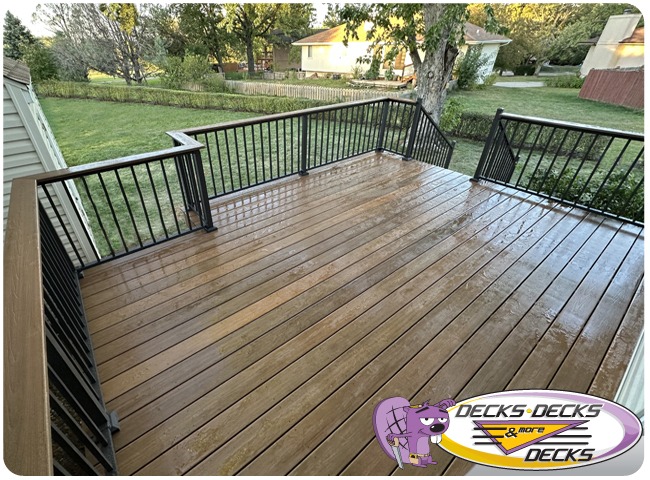Comparing Composite Decking vs. Traditional Wood: Which is Better?
Introduction
If you’re in the process of planning a new deck, you’re likely weighing your options between composite vs. wood decking. Both materials have their merits, but understanding the differences can help you make a well-informed decision. In this blog, we’ll explore composite decking and traditional wood in terms of cost, durability, maintenance, and resale value, and help you decide which material is the best fit for your outdoor project.

Composite Decking Features
One of the first things to consider when comparing composite decking to wood is the materials themselves. Composite decking materials are made from a combination of wood fibers and recycled plastics, which makes them highly resistant to weather, pests, and general wear and tear. Popular options like Composite Trex Decking and Composite Lumber Decking offer a wide range of choices in terms of color, texture, and design.
In contrast, traditional wood decks—whether made from cedar, redwood, or pressure-treated pine—require a lot more attention. While wood has a natural beauty that many homeowners appreciate, it is more prone to issues like rotting, warping, and termite damage. If you’re looking for a low-maintenance option, composite decking durability far exceeds that of wood.
Cost Comparison
When considering the overall cost, composite decking may have a higher initial price than wood, but this doesn’t tell the whole story. While a wood deck might be cheaper to install, the ongoing maintenance required—such as staining, sealing, and replacing damaged boards—can add significant costs over time. When we do a composite decking vs traditional wood cost analysis, we find that composite decking is often more affordable in the long run due to its minimal upkeep and longevity.
Furthermore, composite decking resale value is another important factor to consider. Homeowners who invest in composite decks can often recoup a significant portion of their initial investment when selling their homes. This is especially true in markets like Omaha, where homebuyers are attracted to low-maintenance, high-durability outdoor spaces. Comparing composite vs. wood deck cost over time reveals that composite is a better financial investment.

Warranties and Lifespan
Another area where composite decking outshines traditional wood is in warranties. Many composite decking manufacturers offer generous warranties—sometimes up to 25 years—covering issues like fading, staining, and even structural damage. Composite deck warranties provide homeowners with peace of mind, knowing their investment is protected for decades.
In comparison, warranties for wood decks are much shorter and typically only cover the first few years of use. Moreover, wood decks need regular repairs and replacements, which can add up in terms of both time and money. By contrast, composite decking warranties and longer lifespan make it a hassle-free choice for most homeowners.
Composite Decking Pros and Cons
Of course, there are pros and cons to every building material, and composite decking is no exception. On the positive side, composite decking advantages include its resistance to moisture, rot, and insects, as well as its low maintenance requirements. The range of composite decking colors and the ability to customize your deck with features like composite railings and composite deck lighting are additional perks.
On the downside, composite decking cost is higher upfront compared to wood. Additionally, while the appearance of composite decking has improved significantly in recent years, some homeowners still prefer the natural look and feel of wood. To make an informed choice, it’s essential to consider both the composite decking pros and cons and decide which features are most important to you.
Conclusion
In conclusion, when comparing composite decking vs. traditional wood, it’s clear that composite decking offers superior longevity, durability, and ease of maintenance. Although the initial cost may be higher, the long-term savings and benefits—such as low maintenance and high resale value—make composite decking the better investment for most homeowners. Whether you choose Composite Trex Decking or another option, composite materials are well worth considering for your next outdoor project.

